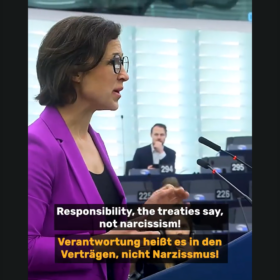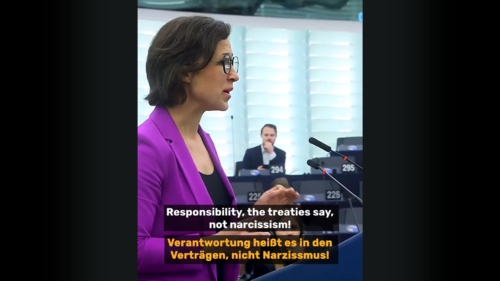You are currently viewing a placeholder content from X. To access the actual content, click the button below. Please note that doing so will share data with third-party providers.
More InformationTime and again, we hear of reports about the misuse of spyware against journalists, lawyers, human rights defenders and politicians. The EU is not spared from these attacks – the latest proof are revelations in the case of Catalonia from last week:
The research lab CitizenLab published a report showing that the devices of at least 65 supporters of the Catalan independence movement were attacked or infected with spyware; Pegasus was used in at least 63 cases. Five MEPs were targeted, either personally or through spyware attacks on family, friends or their professional contacts. This includes members of the Greens/EFA. #CatalanGate is thus considered the largest certified case of cyber-surveillance in history.
At least one of the MEPs affected was working in a parliamentary committee when she was spied on. Thus, confidential information and documents from the committee may also have leaked out.
Due to these incidents and other cases of the misuse of spyware, there is an urgent need to clear things up. Therefore, after many months of political pressure, especially from the Greens and Liberals, the European Parliament has now set up a committee of enquiry on this subject. I am a member of the committee and shadow rapporteur for the Greens/EFA.
The principle of parliamentary immunity has been violated by the recent incidents, and spy software like “Pegasus” can become a threat to democracy – I made this clear in my interview with “Die Zeit” (in German).
Shortly after the revelations surrounding #CatalanGate, I initiated a press conference on the case. Together with three other MPs – including Diana Riba, who was affected by the attack – we wanted to draw public attention to the urgency of the situation. At the conference, I insisted upon our demands:
- A clear statement by the European Parliament with a parliamentary debate in the next plenary session on the importance of parliamentary immunity
- Better IT protection by the relevant bodies in the EU Parliament in order to prevent new attacks
- Full cooperation of all relevant actors with the committee of enquiry
- A ban on the use of “Pegasus” and other mercenary spyware against politicians, journalists and lawyers
- A clear statement by the President of the European Parliament, Roberta Metsola, and the speakers of all national parliaments against such interference in the work of parliamentarians
- The Council should have an honest debate and condemn this kind of politically motivated surveillance
In the committee of inquiry, we will now analyse the recent revelations in detail and examine to what extent the use of the software violates EU law. In addition, the committee will develop recommendations, transparency and control structures as well as legislative initiatives to make the abusive use of spyware in the EU impossible.
To mark the start of the committee, I published a guest article (in German) on gruen-digital.de in which those interested can learn more about the aims of the committee.
I am also particularly concerned about the extent to which Pegasus is being used in the MENA region and internationally, for example against human rights defenders.
Cases of the misuse of the software to suppress civil society have been reported e.g. when it comes to Bahrain, Saudi Arabia and the United Arab Emirates. In Saudi Arabia, for example, the spyware was used against the fiancée and other close allies of the murdered journalist Jamal Khashoggi. Saudi women’s rights activist Loujain Al-Hathloul was also attacked with the spyware, showing once again that critical voices are particularly at risk. In such international cases, we can only take action if there is a link to the EU – but we have already set up in advance that such a link to the Union can often be established (link in German).
In any case I will keep you posted about our further actions!
You are currently viewing a placeholder content from X. To access the actual content, click the button below. Please note that doing so will share data with third-party providers.
More Information











